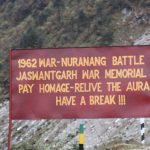The Tale of an Unsung Hero
In the lexicon of Indian military leaders who gave up their lives fighting the British, the names of Tantya Tope or Rani Lakhmibai or Tipu Sultan are easy to come by; but seldom do we notice the name of Muhammed Yusuf Khan, one of India’s earliest military heroes who fought the British to a standstill for almost two years, matching them in the field on every count, and stood his ground as few in the subcontinent ever did. Born a Hindu named Maruthanayagam Pillai in the Ramnad District of what is Tamil Nadu now in 1725, he converted to Islam following casteist oppression and, obtaining professional military training under the French, rose to become one of the outstanding cavalry commanders among the native troops. He allied himself with the French to fight the British in the Carnatic Wars that broke out in Southern India resonating the larger Anglo-French Conflict that was going on in Europe in the seventeen hundreds. A natural with soldiering and leadership, his military prowess drew the attention of the British as their beleaguered garrison at Arcot under Robert Clive faced one daring charge after another led by Yusuf Khan, by then popularly known as Nellore Subedar. Clive, having withstood the siege, made it a point to enlist the services of the gallant Subedar (switching sides to the winning side by soldiers having been the norm then), who was later to prove the scourge of the French in open country warfare.
Grateful for his services, the British made him the Commandant of all Sepoys of East India Company, the first ever Indian to be elevated to officer’s status with British rank and file subordinated to him. Major Stringer Lawrence, the British officer who initiated large-scale recruitment and training of Indian sepoys in the Carnatic plains, signifying the genesis of the future Indian Army and generally considered the ‘father of the Indian Army’, was to describe Yusuf Khan as a ‘born soldier’ whom he found ‘better of his colour I never saw in the country’. And in 1759 when the British wanted a Governor at Madurai to discipline the rebellious southern provinces of Carnatic, they chose him – by now exalted as ‘Khan Sahib’ – for the post, instead of one of their own. During the next couple of years, he not only brought peace to the provinces, but won over the inhabitants by an efficient administration; so much so that the ranks of his army were being filled by the hardened fighters of the area. His writ ran unquestioned in the southern provinces.
Yusuf Khan’s rising reputation made the Nawab of Carnatic, the reigning native ruler and the principal ally of the British, uncomfortable; as was most native rulers’ wont, living in constant fear of their sovereignty being usurped by their vassals who grew powerful. His insinuations forced the British to assume a hostile attitude towards Yusuf Khan, which in turn resulted in his turning against them. Enlisting a small complement of French troops to boost his native soldiery and raising French colours in defiance at his various forts, he declared war on the British early in 1763 as an independent sovereign. In the following months he dealt the British one humiliating defeat after the other as they tried to attack his fortifications; until at last they were forced to beat a retreat after a year of bloody campaigning. Reforming themselves with a massive field force that comprised their entire presidency army, they launched a concerted offensive by the middle of next year to take Madurai where Yusuf Khan was headquartered; only to be thwarted by the dogged defence by his garrison. Reeling under heavy losses the British laid siege to the city. As the siege continued for months blockading all supply routes, the garrison suffered privations and troops’ morale began to drop. Yet Yusuf Khan held on defiantly, until betrayed by some of his own officers, insinuated by one turncoat of a French mercenary, who spread a malicious rumour that he (Khan) was planning to escape with his family, leaving the rest of the garrison in the lurch. Cornered in his quarters by the mutinous officers, Yusuf Khan begged to be put to sword, but was delivered a prisoner, bound down in a palanquin, to the henchmen of the Nawab of Carnatic, his sworn enemy. Accepting his fate with dignity, he made no appeal to spare his life. The next day, 15 October 1764, he was hanged as a rebel by the Nawab while the British watched. And with him went the rank of the Indian Commandant of Sepoys, one which no one else ever held. The British abolished it once and for all, relegating future Indian officers to subordinate status. It will be more than a century and a half before they start commissioning Indians in the army.
This rank betrayal by the British establishment of one of their staunchest allies and such a fine soldier was roundly condemned by many of their own officers who had once been Yusuf Khan’s comrades in arms. And little did Yusuf Khan, the lion-hearted fighter he was, realize that his own countrymen, whom he considered friends and kept writing to proudly of his victories, had hardly a thought for him. Haider Ali, the Mysore ruler, positively offered his support to the British and the Rajah of Tanjore even supplied them with some troops, while the King of Travancore, who was treaty-bound to help him, did not even raise a finger. In recent years, in what was generally perceived as a gesture of repentance, Queen Elizabeth II of England attended the muhurat of a movie on Yusuf Khan that veteran actor and film maker Kamal Hassan had on the anvil (a project that was later abandoned purportedly for religious or casteist controversies it was feared to generate).
The dead body of Yusuf Khan, decapitated and dismembered, as was the barbaric custom of the times, was buried at the spot where he was hanged, near the village of Samattipuram, two miles west of Madurai. A small square mosque, built over the spot later, still exists, and is known by its half-Hindu-half-Muslim name, Khan Sahib’s Pallivasal; a sad, rather inconspicuous memorial for a man who single-handedly stalled the British onslaught for nearly two years.





